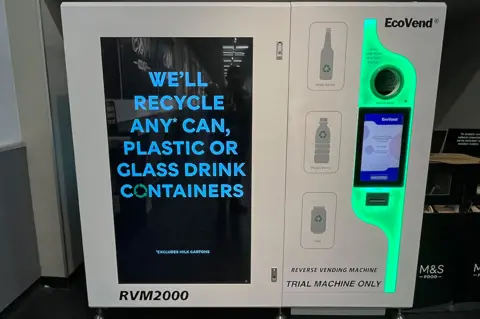Wales FM enters deposit return scheme row
 Reuters
ReutersThe first minister of Wales has entered the row over the deposit return scheme.
Mark Drakeford told the BBC he would "dispute" the UK government's use of the internal market act to stop glass being included.
UK ministers have made the exclusion of glass a condition of their support for a Scottish scheme, arguing that they have responded to business concerns.
They have also warned the Welsh government that decision will affect their plans too.
In a letter to Mr Drakeford, the UK government said "we recognise that the need for alignment and interoperable systems across the UK has implications for Wales".
A UK government source told BBC Scotland that means glass needs to be left out of the Welsh scheme too.
On a visit to Edinburgh, Mr Drakeford said he was "reflecting" on the UK government's actions.
"I would dispute the use of the internal market act for these purposes" he said.
"At the moment glass is in our scheme and that's the way we expect it to stay".
The Welsh scheme is still two years away and there is a UK general election between now and then.
The Welsh government had originally consulted jointly with the UK government (which has been working on plans for England) and the Northern Ireland executive on a scheme that would include glass.

The UK government has subsequently changed its mind on glass, with Mr Drakeford describing it as the "outlier" on deposit return.
At Holyrood, Scotland's First Minister Humza Yousaf accused the Conservatives of "shameful hypocrisy" because they had originally supported the inclusion of glass.
Lorna Slater, the circular economy minister who is leading the deposit return scheme, has claimed the UK government is deliberately trying to sabotage the Scottish scheme.
The Scottish Conservative leader, Douglas Ross denied that is the case and said Ms Slater had wrecked her own scheme through "incompetence" and not listening to industry.
The Scottish government is expected to decide early next week if it will go ahead in March 2024 with a more limited scheme that excludes glass or scrap its plans in favour of a UK wide approach.
The brewer behind Tennent's - C&C Group - has said a Scottish scheme without glass would put its canned lager at a competitive disadvantage with bottled alternatives.
Unless glass is reinstated, it is calling for a UK-wide scheme which is already the preference of the British Soft Drinks Association.
Many businesses have invested in reverse vending machine technology in preparation for a Scottish scheme that was to include plastic, metal and glass containers.
It has been suggested that some firms may seek compensation if the scheme does not go ahead as planned.
